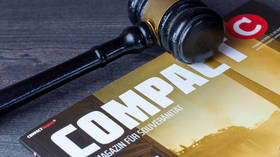Law enforcement officers will mostly focus on crimes allegedly involving insults against politicians, local media reports
Germany’s law enforcement authorities have launched a nationwide crackdown on alleged internet ‘hate speech’, the Federal Criminal Police (BKA) have announced. Two thirds of the cases being investigated are linked to “right-wing” ideologies, the BKA said, with the media reporting they often involve “insults against politicians.”
Some “isolated cases” have been tied to “religious… left-wing and foreign” ideologies, according to police. More than 140 criminal investigations have been opened across all German states.
The list of the most common crimes included incitement of hatred, use of prohibited symbols, and approval of crimes and insults, the police said. According to Germany’s ARD broadcaster, the criminal cases often involve “insults against politicians.”
The police operation included over 65 searches and “numerous” questionings, the BKA stated. Law enforcement has not reported that any suspects were detained as part of the investigations. The BKA also called on the people to “support” the police and contribute to combating online hate by reporting “hate postings” to either law enforcement or their network providers.
Herbert Reul, the interior minister of North Rhine-Westphalia, Germany’s most populous state, lauded the crackdown, which was launched on the 12th Action Day against “criminal hate postings.” Commenting to dpa news agency, he asserted, “Digital arsonists must not be able to hide behind their cell phones or computers.”
The move took place just a day after Germany’s highest administrative court lifted a ban that the federal government imposed on Compact magazine last year. The federal interior ministry had branded the publication a “right-wing extremist” media outlet involved in “anti-constitutional” activities due to its publications on Germany’s migration policies.
The court ruled that the publications could be interpreted as “exaggerated, but ultimately permissible, criticism of migration policy” and declared the ban unlawful. The interior ministry acknowledged the decision but maintained that bans against media outlets do not “constitute impermissible prior censorship” and can be applied in the future.

 4 hours ago
1
4 hours ago
1










